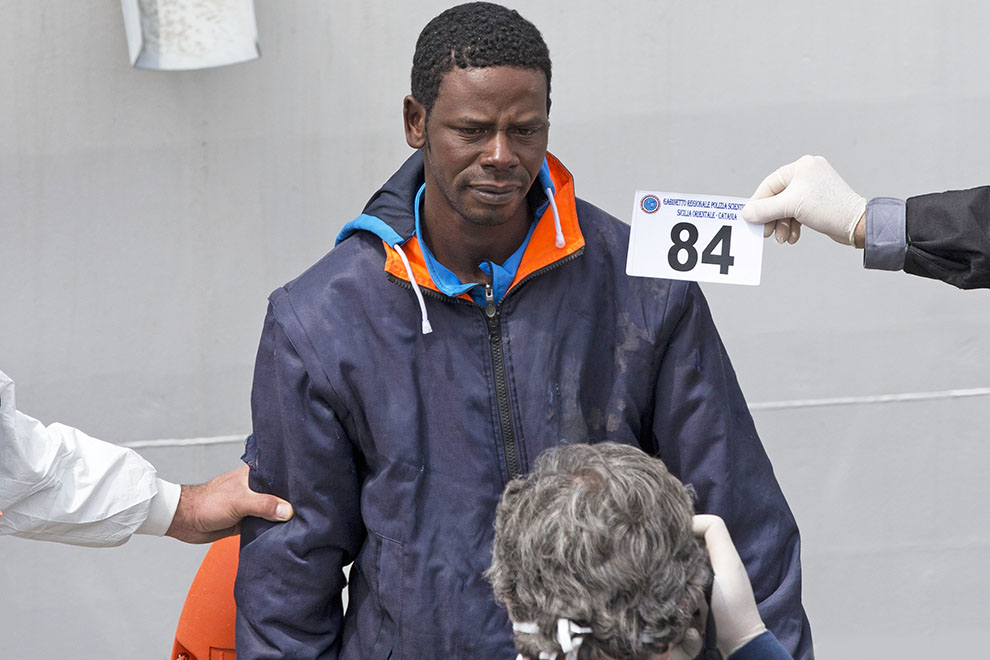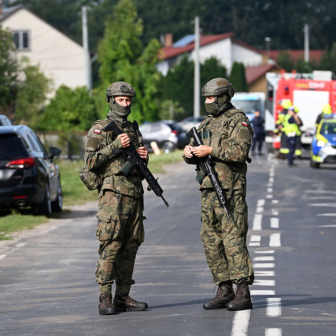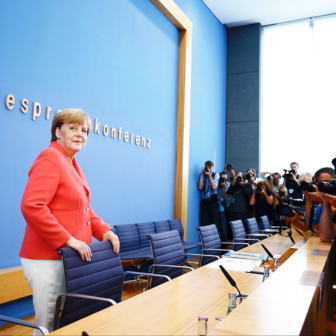Australia might have halted the flow of “illegal maritime arrivals,” as they’ve been designated by the Abbott government since October 2013, but in Europe the boats keep coming. And many of those who embark on dangerously overcrowded vessels from Libya and other countries in North Africa never arrive.
In Libya alone, tens of thousands of people are believed to be waiting for an opportunity to make the dangerous voyage to Europe. Some estimates put the number at one million – but as the University of Queensland’s Phil Orchard has pointed out, we should be wary of figures like these. What we know for certain is that some 31,500 “boat people” arrived in Italy in the first three-and-a-half months of 2015. Another 1500 drowned trying to cross the Mediterranean Sea.
About 80,000 irregular migrants are accommodated in Italy’s reception centres, with thousands of others living in the community. But many of those reaching Italy – or Greece, for that matter – are intent on lodging their claim for asylum in countries further to the north. Under the present EU arrangements, though, someone who arrives by boat in Italy but applies for asylum in Germany, for instance, will be sent back to Italy, which then has to deal with the asylum claim.
At least, that’s how the system is meant to work. But the Italians have been known to look the other way when migrants refuse to be fingerprinted after disembarking; and without fingerprints there is no way to prove where somebody entered Europe. And even if it’s certain that an asylum seeker entered Europe via Italy, he or she won’t necessarily be sent back there. Last month, the Council of Aliens Law Litigation, a Belgian administrative court, ruled in favour of two asylum seekers who claimed that they shouldn’t be sent back to Italy because their applications would not be handled correctly there.
A similar European Court of Human Rights ruling four years ago, in a case involving an asylum seeker sent back to Greece from Belgium, prompted several EU governments to suspend deportations of asylum seekers to Greece. Germany renewed its moratorium on such deportations four months ago because, as interior minister Thomas de Maizière told a Bundestag parliamentary committee, “The treatment of asylum seekers [in Greece] does not always meet European standards.”
The ability to return asylum seekers to where they first landed matters for Germany in particular, which currently hosts many of the irregular migrants arriving via the Mediterranean. Last year, it received 202,834 applications for asylum. A few days ago, the Bundesamt für Migration und Flüchtlinge, the government’s refugee agency, predicted that this year’s numbers will be twice as large. (By comparison, in the 2012–13 financial year, at the height of the influx of asylum seekers to our shores, Australia received a total of 26,427 applications for a protection visa, 18,119 of them from people who had arrived by boat.) On Friday, in an emergency meeting chaired by Angela Merkel, de Maizière promised the German state premiers that the federal government would fund an extra 2000 positions for the agency assessing asylum seeker claims, 750 of them in this financial year.
Four days after a migrant boat capsized on 19 April, killing more than 800 of those on board, the European Union convened a special meeting of the European Council, which brings together the heads of all EU governments. In a statement released afterwards, the Council said that the European Union “will mobilise all efforts at its disposal to prevent further loss of life at sea and to tackle the root causes of the human emergency we face.” Its “immediate priority,” the Council emphasised, “is to prevent more people from dying at sea.”
Fewer people died last year, when Italy used its navy to scour the waters south of Italy for migrant vessels in distress. Between October 2013 and October 2014, according to Italian Ministry of Defence statistics, the navy rescued a total of 150,810 people in 421 operations. The Italian government called this undertaking Operation Mare Nostrum (“our sea”) after the name given to the Mediterranean at the time of the Roman Empire, which was used again last century, perhaps more significantly, by Mussolini and the Italian fascists. But even such unsubtle references to a period of Italian geopolitical grandezza did not convince Italians to support the extension of the costly one-year operation, and so, in October last year, search and rescue operations again became the responsibility of individual European and North African countries and of the European Union. The latter, in an effort to replace Operation Mare Nostrum, established Operation Triton, a comparatively poorly resourced effort led by the EU border control agency Frontex.
The EU heads of government meeting on 23 April decided to triple the resources allocated to Triton and Poseidon (another Frontex operation in the Aegean Sea). But even that increase doesn’t match the resources allocated by the Italians to Operation Mare Nostrum, and is not enough to mount comprehensive search and rescue operations in the Mediterranean. And apart from the extra funds, the European Council had little to show: it promised to step up its fight against trafficking, to “tackle the cause of illegal immigration” and “set up a new return program for the rapid return of illegal migrants from frontline member states,” and to provide more assistance to the EU countries that were receiving most of the irregular migrants.
The Council’s announcement prompted a joint response from António Guterres, the UN High Commissioner for Refugees, Zeid Ra’ad Al Hussein, the UN High Commissioner for Human Rights, Peter Sutherland, the UN Secretary-General’s Special Representative for International Migration and Development, and the International Organization for Migration’s William Swing. They welcomed some of the proposed measures as an “important first step” but argued that these did not go far enough. They were also critical of what they perceived to be the Council’s prioritising of border security over human security. “Law enforcement measures,” they said, “must be accompanied by efforts aimed at reducing the need for migrants and refugees to turn to smugglers in the first place.”
Some of the NGOs advocating for refugees and other irregular migrants were far less diplomatic. The European Council on Refugees and Exiles, or ECRE, concluded that “European leaders are shutting their eyes and refuse to see the refugee crises raging in our neighbourhood.” It was particularly critical of the European Union’s focus on people smuggling, arguing that it refuses “to see that refugees use smugglers in desperation, because they have no other option and barely have any legal means to reach safety.”
At the other end of the spectrum, Katie Hopkins, who shot to fame as a contestant in a British reality television show, went on to poll 0.6 per cent of the votes as an independent in the 2009 European elections, and has since become a columnist for the London Sun, likened irregular migrants trying to reach Europe to cockroaches. “They might look a bit ‘Bob Geldof’s Ethiopia circa 1984,’” she wrote, “but they are built to survive a nuclear bomb. They are survivors.” For Hopkins, there was a proven recipe to deal with such survivors:
It’s time to get Australian. Australians are like British people but with balls of steel, can-do brains, tiny hearts and whacking great gunships. Their approach to migrant boats is the sort of approach we need in the Med. They threaten them with violence until they bugger off, throwing cans of Castlemaine in an Aussie version of sharia stoning. And their approach is working. Migrant boats have halved in number since Australian Prime Minister Tony Abbott got tough… Bring on the gunships, force migrants back to their shores and burn the boats.
Even the architects of Australia’s deterrence policies would have cringed when they read Hopkins’s diatribe. But that did not stop them from recommending that Europe emulate Australia’s approach. In the Australian two weeks ago, retired major-general Jim Molan poured scorn on the “incompetent policy reaction by European authorities.” Having played a key role in designing and implementing Australia’s current policies, Molan offered this advice:
Europe needs to make a very big decision and to make it soon. If it does not want to control its borders then it should establish a sea bridge across the Mediterranean, let everyone in who wants to come, and not let these people die… European governments should realise that border control can be done and start showing a bit of leadership. It may involve some tough policy from European governments who appear weak on many issues, but borders can be controlled, they can be controlled to the benefit of all, and there is a moral obligation to control them.
And who better to counsel the likes of Angela Merkel and François Hollande than prime minister Tony Abbott? “Plainly, there is a terrible, terrible tragedy unfolding in the Mediterranean right now,” he told journalists ahead of the 23 April meeting of the European Council. “I suppose we must grieve for the loss but at the same time we must resolve to stop this terrible problem and the only way you can stop the deaths is to stop the people smuggling trade. The only way you can stop the deaths is in fact to stop the boats.”
For Australia, the combination of turning back, handing over, mandatory detention and extraterritorial processing has proven to be an immensely costly yet deceptively neat solution. But as the evidence from the hellholes of Nauru and Manus, and from countries of origin such as Sri Lanka and transit countries such as Indonesia, shows, these policies have not offered a solution for people seeking the protection of governments other than their own. And while Operation Sovereign Borders may have saved the lives of people who would have otherwise drowned in an attempt to reach Australia by boat, Australia’s policies simply shifted the problem out of sight: either forcing people in search of protection to embark on other, no less risky, journeys, or compelling them to stay where they are and continue to be exposed to persecution. As tempting as it may be for Australia to try exporting $200,000 disposable life-boats to Europe for use in the Mediterranean Sea, it is unlikely at this stage that the European Union would want to emulate the Abbott government’s approach.
Not that the Europeans would need to study the Australian case to understand why the answer doesn’t lie simply in stopping the boats (and turning them back, or handing their passengers over to the authorities of another country without properly assessing their protection claims). After all, this was the approach Italy adopted under Silvio Berlusconi. Irregular migrants were pushed back towards Libya under a policy of respingimenti, made possible after the Italian government signed an agreement with the Libyan dictator Muammar Gaddafi. Three years ago, the European Court of Human Rights condemned Italy’s policy in a ruling on the treatment of a group of Somali and Eritrean asylum seekers who had been intercepted by the Italian coastguard in May 2009, transferred onto an Italian naval vessel, and then handed over to the Libyan authorities. In 2013, the Italian government launched Operation Mare Nostrum not least because respingimenti had been utterly discredited.
What, then, is the solution to the current crisis in the Mediterranean? In April ECRE put forward a ten-point plan. Among other things, it calls for a much-expanded search and rescue operation (of at least the size of Operation Mare Nostrum); an increase in the number of refugees resettled in Europe; an opportunity for refugees to apply for protection at EU embassies; the facilitation of family reunion; an expansion of “legal channels for migration beyond highly skilled workers”; voluntary return programs; “genuine solidarity” with the member countries where asylum seekers disembark; and the development of a “comprehensive cooperation agenda with countries of origin and transit to build resilient protection systems in close cooperation with UNHCR, enhance efforts to address root causes of refugee flight and support migration and mobility through development cooperation.”
In essence – and much like the approach agreed on by the European Union’s heads of government – this is an attempt to manage the current crisis. Neither plan offers a sustainable, long-term solution. That’s not because responses propagated by NGOs are as fraught as those implemented by the European Union through Frontex, but because there will be no solution to a problem caused by the lack of human security in much of the Middle East and Africa, or by blatant global inequality, until these causes no longer loom large. Policy responses that pretend to be solutions, including Australia’s Operation Sovereign Borders, only appear successful because their promoters have managed to hide some of their human costs.
While there seems to be little prospect of successfully tackling the root causes of irregular migration in the short to medium term, it is crucially important to respond effectively to the current crisis in the Mediterranean. While ECRE’s proposals are a step in the right direction, the European Union’s action plan is disappointing, not least because it naively assumes that it is possible to curb mobility beyond Europe’s borders.
Both ECRE and the EU leaders realise that it is important for EU members to take equal shares of the burden created by the spontaneous arrival of hundreds of thousands of irregular migrants. Angela Merkel has gone so far as to say that Dublin III, the EU regulation that makes the countries of arrival responsible for asylum seekers, needs to be scrapped.
While the European Union and ECRE demand a greater commitment to solidarity, they mean solidarity between member states. Refugee lawyers Mariagiulia Giuffré and Cathryn Costello have noted that the EU statement does not refer to solidarity with refugees. It is important to make that point. But solidarity between European nations (say, Britain vis-à-vis Malta) does not prevent other forms of solidarity. In fact, it might be that in Europe a broader notion of solidarity – with refugees fleeing persecution and with irregular migrants from war-torn or impoverished countries – will be strengthened by an increased emphasis on solidarity among EU member states.
In what was presumably a gesture of intra-European solidarity, German defence minister Ursula von der Leyen has ordered a navy frigate and a supply ship to be redeployed in the Mediterranean to assist the search-and-rescue effort. So far, they have rescued 419 men, women and children in three separate operations. France and Britain have also sent ships to the Mediterranean. Last week, the Royal Navy’s HMS Bulwark plucked 110 migrants from a sinking dinghy, and the Commandant Birot, a French patrol boat, rescued another 217 people off the coast of Libya.
These deployments have not been part of the package agreed to by the European Council in April. Their significance is probably best understood by recalling an incident that happened four years ago in the same waters in which European frigates and patrol boats are now searching for vessels in distress. According to a Guardian investigation, a boat carrying seventy-two irregular migrants had left Tripoli for the Italian island of Lampedusa, run into trouble, and drifted for sixteen days in open waters. All but eleven of its passengers died. Four or five days into its journey, when it had long run out of fuel, the boat encountered an aircraft carrier the Guardian identified as the French ship Charles de Gaulle. “According to survivors,” the newspaper reported, “two jets took off from the ship and flew low over the boat while the migrants stood on deck holding the two starving babies aloft.”
The German government’s decision to dispatch two navy ships to the Mediterranean was designed to send a message not only to the Italian government but also to a domestic audience uncomfortable with the European Union’s half-hearted approach. Support in Germany for an Operation Mare Nostrum mark II extends into the government’s ranks. Two weeks ago, the conservative Christian Social Union’s Gerd Müller, who has responsibility for Germany’s foreign aid in Merkel’s cabinet, demanded an immediate recommencement of Mare Nostrum. In countries like Germany, the Italian operation captured the imagination because it epitomised solidarity – with irregular migrants literally dying to reach Europe.
Some have associated that latter kind of solidarity with the very idea of Europe. They include the Pope, who called for a “Europe which cares for, defends and protects man, every man and woman” in a speech to the European parliament last year. He has, of course, been at the forefront of those demanding that solidarity – rather than pity – should be extended to irregular migrants. He strikes a chord with significant sections of “Europe” when he tries to link a European cultural identity with Europe’s response to migrants.
The exhortation “to get Australian” clearly hasn’t convinced admiral Donato Marzano, who heads the Italian navy, either. “I am a sailor who has spent twenty years on boats. If I find a boat adrift, I’m sorry, but I don’t turn away,” he said last week after being asked what he thought about Australia’s approach. “I intervene to help people at sea. I don’t know if this reflects my Italian culture but I do know it is law.”
As long as the boats keep coming, though, the temptation to look towards Australia will remain, particularly for populists in search of votes. It won’t be possible to counter that assertion simply by pulling an alternative quick-fix out of the hat. The challenge is to convince European governments and civil society that there is no easy solution.
And if, for the time being, people in Europe advance a more humane approach to irregular migrants because they believe that solidarity is intrinsically European (or Italian, for that matter), why would we want to quibble anyway? •




